MercoPress. South Atlantic News Agency
Tag: Alexandre Tombini
-
Thursday, June 9th 2016 - 09:06 UTC
Brazil's central bank leaves interest rate unchanged at 14.25%
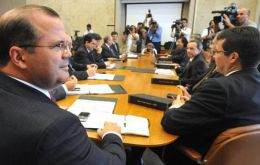
Brazil held interest rates steady for the seventh straight time on Wednesday, resisting pressure to slash borrowing costs amid a recession as inflation remains near double digits. In a unanimous vote, the central bank's monetary policy committee, Copom, decided at its last meeting led by governor Alexandre Tombini to keep its benchmark Selic rate at 14.25%, the highest in nearly a decade.
-
Wednesday, May 18th 2016 - 06:01 UTC
Orthodox economist Goldfajn confirmed as Brazil's central bank governor
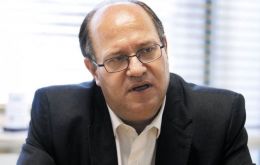
Brazil's interim government on Tuesday confirmed the lead economist of the country's largest private bank to head the central bank, in a further shift away from the interventionist policies that many blame for deep recession and near double-digit inflation.
-
Thursday, May 12th 2016 - 08:53 UTC
Goldfajn considered the most probable candidate for Brazil's central bank

Brazil's Vice President Michel Temer could wait until June to appoint a new central bank chief if he takes over the reins of power this week, as part of a gradual transition to replace the bank's eight-member board, his spokesman said on Wednesday.
-
Friday, April 29th 2016 - 06:50 UTC
Brazil's central bank leaves benchmark rate at 14.25% forced by stubborn inflation
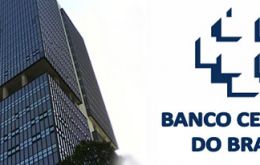
Brazil's central bank left its benchmark interest rate on hold at 14.25% for a sixth consecutive time, amid stubbornly high inflation and political uncertainty. The bank which makes rate decisions eight times a year has held its key Selic rate steady since the last of seven consecutive hikes in July 2015.
-
Thursday, March 3rd 2016 - 05:03 UTC
Brazil leaves key interest rate unchanged at 14.25% for the fifth time running
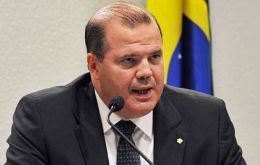
Brazil's central bank kept interest rates on hold on Wednesday as widely expected, opting to avoid inflicting more harm on an economy mired in its worst recession in decades despite a surge in inflation. In a split vote, the bank's monetary policy committee, Copom, kept its benchmark Selic rate at 14.25% for the fifth straight time.
-
Thursday, January 21st 2016 - 07:13 UTC
In a surprise move, Brazil's central bank leaves interest rate unchanged at 14.25%
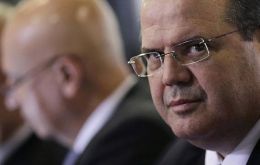
Recession-hit Brazil's central bank in a divided vote left the key interest rate untouched on Wednesday despite rising inflation, opting against an increase that could put a further brake on the world's seventh-biggest economy.
-
Monday, November 2nd 2015 - 08:43 UTC
Brazilian central bank opposes using the country's US$ 370bn reserves
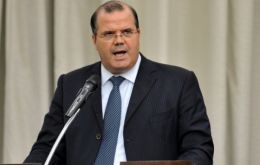
Brazil's central bank chief, Alexandre Tombini, told lawmakers he opposes using the country's $370 billion foreign reserves at this moment as they serve as an insurance policy for Latin America's largest economy.
-
Thursday, October 22nd 2015 - 07:09 UTC
Brazil leaves Selic rate unchanged at 14.25%; inflation the target but with no timetable
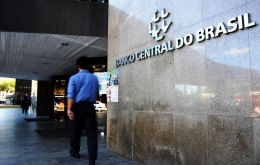
Brazil's central bank kept interest rates on hold on Wednesday, for a second straight month despite a jump in inflation expectations. The decision not to raise rates will give a breather to President Dilma Rousseff, who is fighting for her political survival amid the country's worst economic and political crisis in 25 years.
-
Monday, September 28th 2015 - 10:35 UTC
Brazil has sufficient reserves, but Rousseff concerned about companies with dollar debts

Brazil President Dilma Rousseff cited the nation's foreign currency reserves as a backstop to excessive volatility and weakness in the Brazilian Real.
-
Friday, September 25th 2015 - 07:17 UTC
Brazil's Real recovers ground after Central bank promises to use all 'instruments available'

Brazil's depressed currency rebounded Thursday after the head of its central bank vowed to use all instruments in its arsenal to curtail the Real's collapse. Earlier in the day the Real tumbled to an all-time low of 4.248 to the U.S. dollar, but bounced back to 4.023 after central bank President Alexandre Tombini, in an unscheduled press briefing, did not rule out selling part of the country's $371 billion foreign reserves to calm the exchange rate market.
